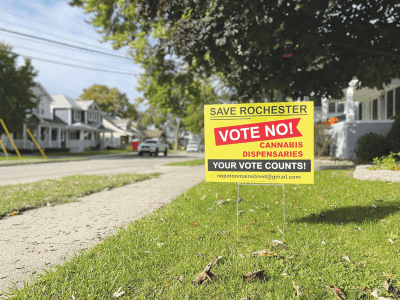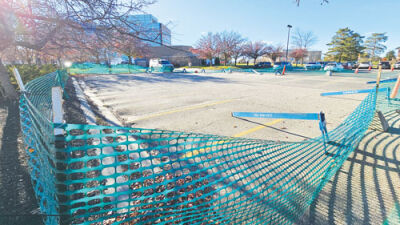ROCHESTER — On Nov. 7, Rochester residents will vote on two ballot proposals relating to the sale of cannabis in the city.
Rochester City Attorney Jeffrey Kragt said that, typically, ordinances and charter amendments are initiated by the City Council, but in this case, the two proposals were initiated via petition — from an advocacy group based in Stockbridge, Michigan, called the “Open Stores In Rochester Committee.”
The Michigan Regulation and Taxation of Marihuana Act — which passed in 2018, legalizing the use and possession of recreational marihuana for people over 21 years of age — allows citizens to initiate an ordinance allowing marihuana establishments to be on the ballot through a petition.
The first proposal on the Nov. 7 ballot will ask Rochester voters if an ordinance should be passed to allow three adult-use cannabis retail establishments to operate within the city of Rochester.
“This is not something that the City Council is initiating. It is purely by petition,” Kragt explained. “When they have a certain number of people sign the petition, then it becomes something that can move forward.”
Currently, city ordinances — adopted in November 2018 — specifically prohibit any marijuana establishments in the city, Kragt noted.
“What these petitions are trying to do is to undo what is currently on the books,” he said. “It would allow three retail marijuana stores in the city of Rochester, and it would be treated just like regular retail stores in the city. … So essentially, think of wherever retail would be, this would be permitted.”
Under the proposal, licensed commercial cannabis-related commercial activities would be prohibited within an area zoned exclusively for residential use, as well as within 800 feet of a pre-existing public or private school providing education for kindergarten-grade 12.
“It could, theoretically, be right downtown — three of them right downtown,” Mayor Stuart Bikson added.
The second proposal asks voters if a cannabis licensing charter amendment should be passed to establish an application process, selection criteria, licenses, fees and regulations for three adult-use retail cannabis establishments in the city.
Kragt said the language of the petitions — which was written by the Open Stores in Rochester Committee, not the city — establishes the terms, regulations and qualifications of the proposed ordinance and charter amendment.
“If passed, the language in the petitions would be part of the City’s Charter and Code of Ordinances. There would not be any ongoing involvement of the outside group, other than applying for the licenses that they are trying to get passed, of course. They are the ones that put the proposed language together that they are asking the voters to adopt. If adopted, then the City would have to implement the language found in the proposals,” Kragt said in an email.
Rochester DDA Chairman Ben Govanelli said the Open Stores in Rochester Committee had to get 360 signatures for the ordinance and 560 for the Charter amendment to be placed on the ballot.
Since then, he said, the group has proceeded to secure site locations, via the signing of leases with property owners for the proposed locations — which in this case, he said, are all within the DDA District.
At press time, Rochester City Manager Nik Banda said the city had received four letters for three locations — one had two letters for the same address, Bangkok Cuisine, 727 N Main St. The other two proposed locations, Banda explained, include The Sound Advantage building at 908 N. Main and Rochester Chiropractic Clinic at 900 N. Main.
While Giovanelli said the DDA will not take any position on the cannabis issue per se, as that issue has already been decided by voters statewide, he said the DDA has concerns about the proposals.
“Our concern as advocates for the Downtown, the customers, merchants and property owners in the district is two-fold. Our primary concern is a widely agreed upon and undeniable massive uptick in traffic counts in the area that follows these facilities. The other is any effect on property values, demand and rents in general in the district these may bring,” he said in a statement posted on the DDA’s website.
The city, he said, would receive approximately $60,000 per year in tax revenue per location, so the three proposed locations equate to $180,000 — which he noted is approximately 1% of the Rochester city general fund and DDA combined budget this year of $17.5 million.
A grassroots committee of concerned city residents and business owners, called the No Pot On Main Street Committee, said that while they are not against the use of marijuana, they are against the two ballot proposals.
“It’s not an objection to the use or ability for someone to buy marijuana in Rochester. Rather, this is an objection to the location and having three dispensaries in the principal shopping district. It’s really no more than that,” said Christian Hauser, a member of the No Pot on Main Street Committee. “And it’s also a function of an outside group coming in and dictating to the city how and when and where these stores are going to be located, versus the city — and more importantly, the constituents — determining where these dispensaries should be located.”
Hauser, who sits on the city’s Planning Commission, said members of No Pot on Main Street are concerned with the number of proposed retail stores, the locations, the increase in the traffic, the burden on the infrastructure and the spillover to the adjacent neighborhoods.
“The city, the residents, the owners, the police, zoning people, planning, should all have a seat at the table when it comes to any type of business in the city of Rochester — and in particular, a dispensary, or dispensaries, if we are going to have more than one. That simply hasn’t happened here,” he said. “The bigger objection I have is that an outside group has crafted an ordinance that specifically benefits them, at the expense of other potential dispensary owners. The first ballot proposal would lift the prohibition, and then the second one provides how the licensing would take effect, and if you read that, it only benefits the group who put the proposal on the ballot, and it’s detrimental to anyone else.”
Rochester resident and attorney Noah Harfouch is in favor of the proposal.
“As an attorney deeply involved in the cannabis industry, I’ve had the opportunity to work and collaborate with various municipalities across the state of Michigan. Over time, I’ve witnessed a shift in their views on cannabis business — from skepticism to recognition that it operates under a regulatory framework that brings substantial benefits to both local economies and communities at large. Retail cannabis establishments are not just businesses; they’re potential catalysts for positive change. They create meaningful high-paying job opportunities and contribute to the community’s prosperity by generating tax revenue that can fund essential public services and projects,” Harfouch said in an email.
Looking ahead, Harfouch said it’s evident that cannabis businesses are on a trajectory to becoming as commonplace as any other retail venture.
“It’s in the best interest of municipalities to embrace this shift, acknowledging the notable financial benefits that come with it. Based on my professional experience, communities that have welcomed these businesses have cultivated dedicated community partners and haven’t expressed regret for establishing a process that facilitates their operations. The decision-making power now rests with the voters in Rochester — a fundamental aspect of our democratic process. I strongly encourage all eligible voters to participate and contribute to the ongoing growth and development within the community through their vote,” Harfouch said in an email.
A representative from the Open Stores in Rochester Committee did not return calls for comment by press time.
The full text of the ordinance and charter amendment is available on the city of Rochester’s website at www.rochestermi.org/CityClerk/elections. For a complete list of candidates and ballot issues, visit the Oakland County Clerk’s election page.
 Publication select ▼
Publication select ▼




















